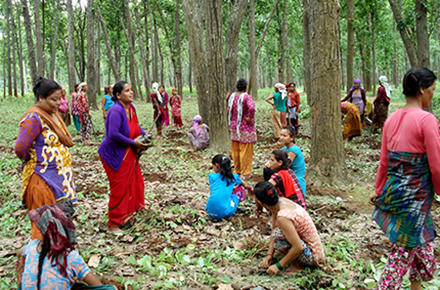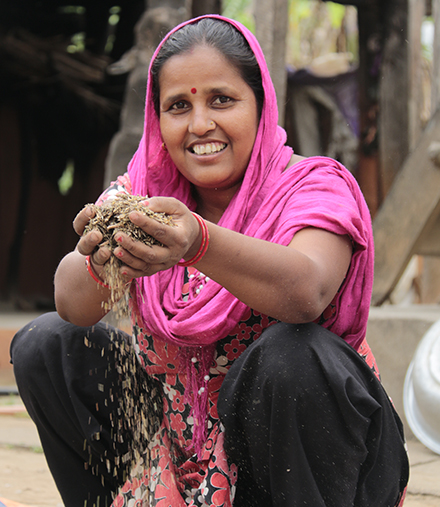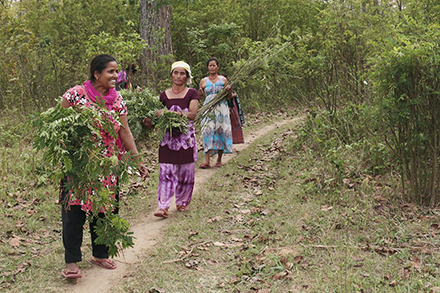Bindu Dahal, 39, lives in Nepal's Nayabelhani Village, which is next to a community forest in the larger Madhyavarti Forest. Over the years, Bindu has watched her village grow from a few huts to a large settlement. As the population steadily increased, so did the demand for food and fuel. People started encroaching on the forest lands, cutting down trees for timber and farming and rapidly depleting the forest.

Bindu joined a Heifer Nepal self-help group (SHG) three years ago, which helped her realize the importance of the forest for her community. Heifer Nepal provided the women in the SHG with goats and social and technical trainings, improving the livelihoods of smallholder rural families through agriculture- and livestock-based value chain enterprise development.
After receiving fodder and forage management training, Bindu and her fellow group members planted fodder and forage seeds and saplings on their farms. They also collaborated with the Community Forest User Group (CFUG) to extend their plantation.
"We wrote a letter to the CFUG requesting their permission to plant the fodder and forage in the empty land inside the forest," she said. "They granted us the permission."
With help from a Heifer partner organization, the women organized a successful fodder and forage plantation event, which district forest officers, the ranger from the buffer zone and other stakeholders attended.
"It was one of the proudest moments of my life," Bindu said.

This Earth Day, help farmers around the world on their journey to sustainable farming.
Before starting the plantation, the women cleared out weeds that were hampering the growth of other plants and trees. By the end of the month, Bindu's group had planted fodder and forage on 1.6 hectares of the community forest. Under Heifer Nepal's Exponential Passing on the Gift® model, Bindu's group has helped form 10 pass-on groups, which have planted another 1.6 hectares of community forest land with fodder and forage. The plantation has not only increased livestock productivity, but it has helped protect the forest area and its biodiversity. In fiscal year 2015, groups planted 3,333 hectares of land with fodder and forage in the Heifer Nepal project area.
The plantation gives people easier access to fodder and forage, as the members divide it equally among themselves to feed to their animals. Heifer's annual project survey shows that 52 percent of project beneficiaries report to having fodder and forage available year-round, while 34 percent report having it available for only four to eight months. This plantation helps change those numbers.
Feeding nutritious fodder and forage to the livestock, along with the practice of improved animal management that Heifer introduced in the area, resulted in increased income from sale of goats and milk from dairy cattle. Last year, the group earned 80,000 Nepalese rupees, or about $750, from selling fodder seeds. This year, they project an income of 150,000 Nepalese rupees, or about $1,400, from fodder seed sales. The group saves the income in their group fund with their monthly savings so they can lend it to other members at affordable interest rates.
This year, Bindu earned 80,000 Nepalese rupees, or about $750, by selling five goats, and 150,000 Nepalese rupees, or about $1,400, by selling milk.

"Before joining the project I did not even raise goats," she said. "Goats are a good source of income, and since we have plenty of fodder to feed them now, it doesn't add to our workload."
Families in Nayabelhani have increased their livestock's productivity in recent years, and a local dairy cooperative even started sending a small truck to collect milk in the village. Before, farmers had to take small cans of milk to the dairy.
The buffer zone ranger, who participated during the fodder and forage plantation event, knows the women's group well and asked the members to help watch for people encroaching on the forest to build houses or expand farm lands.
"There are people who are ignorant about the importance of protecting our forest," she said. "They put fire in the forest to harvest mushrooms."
A recent forest fire lasted for days before the group gathered other villagers to help control the fire before it entered their village.